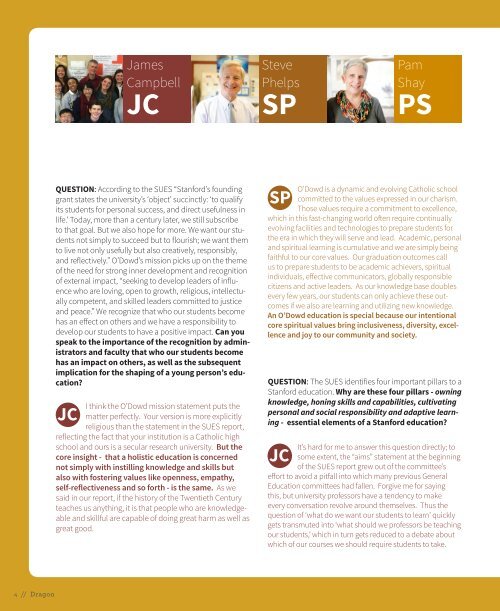Winter 2016
2016 winter dragon
2016 winter dragon
You also want an ePaper? Increase the reach of your titles
YUMPU automatically turns print PDFs into web optimized ePapers that Google loves.
James<br />
Campbell<br />
JC<br />
Steve<br />
Phelps<br />
SP<br />
Pam<br />
Shay<br />
PS<br />
QUESTION: According to the SUES “Stanford’s founding<br />
grant states the university’s ‘object’ succinctly: ‘to qualify<br />
its students for personal success, and direct usefulness in<br />
life.’ Today, more than a century later, we still subscribe<br />
to that goal. But we also hope for more. We want our students<br />
not simply to succeed but to flourish; we want them<br />
to live not only usefully but also creatively, responsibly,<br />
and reflectively.” O’Dowd’s mission picks up on the theme<br />
of the need for strong inner development and recognition<br />
of external impact, “seeking to develop leaders of influence<br />
who are loving, open to growth, religious, intellectually<br />
competent, and skilled leaders committed to justice<br />
and peace.” We recognize that who our students become<br />
has an effect on others and we have a responsibility to<br />
develop our students to have a positive impact. Can you<br />
speak to the importance of the recognition by administrators<br />
and faculty that who our students become<br />
has an impact on others, as well as the subsequent<br />
implication for the shaping of a young person’s education?<br />
JC<br />
I think the O’Dowd mission statement puts the<br />
matter perfectly. Your version is more explicitly<br />
religious than the statement in the SUES report,<br />
reflecting the fact that your institution is a Catholic high<br />
school and ours is a secular research university. But the<br />
core insight - that a holistic education is concerned<br />
not simply with instilling knowledge and skills but<br />
also with fostering values like openness, empathy,<br />
self-reflectiveness and so forth - is the same. As we<br />
said in our report, if the history of the Twentieth Century<br />
teaches us anything, it is that people who are knowledgeable<br />
and skillful are capable of doing great harm as well as<br />
great good.<br />
SP<br />
O’Dowd is a dynamic and evolving Catholic school<br />
committed to the values expressed in our charism.<br />
Those values require a commitment to excellence,<br />
which in this fast-changing world often require continually<br />
evolving facilities and technologies to prepare students for<br />
the era in which they will serve and lead. Academic, personal<br />
and spiritual learning is cumulative and we are simply being<br />
faithful to our core values. Our graduation outcomes call<br />
us to prepare students to be academic achievers, spiritual<br />
individuals, effective communicators, globally responsible<br />
citizens and active leaders. As our knowledge base doubles<br />
every few years, our students can only achieve these outcomes<br />
if we also are learning and utilizing new knowledge.<br />
An O’Dowd education is special because our intentional<br />
core spiritual values bring inclusiveness, diversity, excellence<br />
and joy to our community and society.<br />
QUESTION: The SUES identifies four important pillars to a<br />
Stanford education. Why are these four pillars - owning<br />
knowledge, honing skills and capabilities, cultivating<br />
personal and social responsibility and adaptive learning<br />
- essential elements of a Stanford education?<br />
JC<br />
It’s hard for me to answer this question directly; to<br />
some extent, the “aims” statement at the beginning<br />
of the SUES report grew out of the committee’s<br />
effort to avoid a pitfall into which many previous General<br />
Education committees had fallen. Forgive me for saying<br />
this, but university professors have a tendency to make<br />
every conversation revolve around themselves. Thus the<br />
question of ‘what do we want our students to learn’ quickly<br />
gets transmuted into ‘what should we professors be teaching<br />
our students,’ which in turn gets reduced to a debate about<br />
which of our courses we should require students to take.<br />
4 // Dragon


